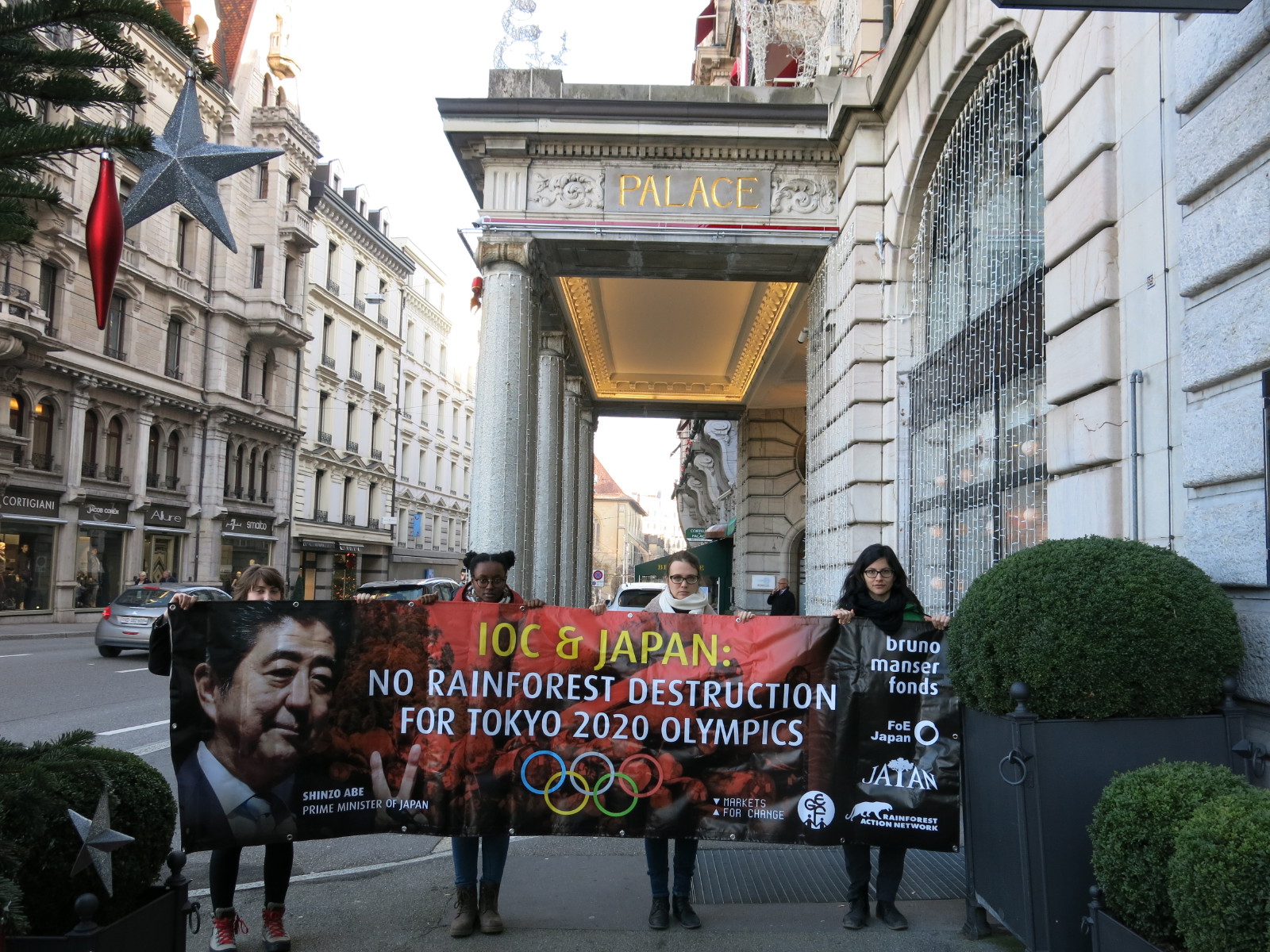Contact:
[Japan] Yuki Sakamoto, Global Environmental Forum, sakamoto@gef.or.jp, +81-3-5825-9735
[US] Hana Heineken, Rainforest Action Network, hheineken@ran.org, +1-609-553-4844
[Malaysia] Nicholas Mujah, Sarawak Dayak Iban Association, sadiahq@gmail.com, +60-168946976
[EU] Annina Aeberli, Bruno Manser Fund, annina.aeberli@bmf.ch, +41 79 128 58 73
Over 40 NGOs deliver letter to IOC cautioning that timber for Olympic Stadium and other venues risks connections to human rights and environmental violations
Lausanne, Switzerland – As Olympic organizers deliberate on cost-cutting measures for the 2020 Tokyo Olympics [1], a letter endorsed by 44 organizations was hand-delivered today to the International Olympic Committee (IOC) during its winter board meeting, warning Olympic organizers of the high risk that illegal and unsustainable rainforest timber will be used to construct Tokyo’s new Olympic National Stadium and other facilities. The groups warned that failure to adopt additional safeguards and due diligence measures could have devastating consequences for biodiversity, climate change, and local communities who have legitimate rights to the forests and rely on it for their livelihoods.
Japan has long been a focus of criticism by civil society and the international community for driving rainforest destruction by its timber consumption.[2] Japan is the world’s largest importer of tropical plywood, much of it sourced from the rainforests of Malaysia and Indonesia. In particular, NGOs highlight the situation in Sarawak, Malaysia, which supplies nearly half of Japan’s imported plywood. Sarawak has one of the highest rates of deforestation in the world and an extremely high rate of illegal logging.[3] Indigenous communities in Sarawak have been fighting logging companies for decades in an effort to protect their native lands, with sometimes deadly consequences.[4]
Independent investigations have linked plywood used by Taisei Corporation, which will build the new Olympic Stadium, to a biodiversity hotspot in Sarawak that is experiencing one of the highest rates of deforestation in the world due to extremely destructive logging practices.[5] “Sarawak’s logging companies have destroyed our forests and polluted our drinking water. They have violated our rights as indigenous peoples and robbed us of our livelihood,” says Nicholas Mujah of the Sarawak Dayak Iban Association.
“The Tokyo Olympic organizers are not doing enough to avoid the use of timber linked to violations of indigenous rights, illegal logging, and rainforest destruction,” says Junichi Mishiba of Japan-based Friends of the Earth-Japan. “Using illegal and unsustainable timber to build the Olympic buildings in Tokyo would go against the organizers’ commitment to sustainability and leave a terrible legacy.” NGOs are calling on the IOC to demand stronger standards by the Tokyo organizers, consistent with the IOC’s commitment to “ensure that [sustainability] is included in all aspects of the planning and staging of the Olympic Games.” [6] At a meeting of experts on December 4th, Tokyo Governor Yuriko Koike said she was familiar with the issue and will raise its voice as the contractee for many of the projects.[7]
The Tokyo Olympics has attracted record corporate sponsorship, but sponsors could face serious reputational risk by helping to fund construction of these Olympic projects. “At a time when more companies and governments are committing to no deforestation, this would be a huge step backward. The IOC and sponsors should step up and demand the Tokyo organizers to ensure that all timber used for Olympic construction comes from legal and sustainable sources, with the free, prior and informed consent (FPIC) of local communities”, says Hana Heineken of California-based Rainforest Action Network.
…
Pictures of the handover of the letter will be available here on December 6 from 1pm CET: https://www.dropbox.com/sh/vgmtiy969qyhnku/AABdZWkpHze000BL-o8TPlK1a?dl=0
…
[1]www.olympic.org/news/in-the-wake-of-rio-s-marvellous-games-tokyo-makes-strong-strides-towards-2020
[2] Friends of the Earth, From policy to reality: ‘Sustainable’ tropical timber production, trade and procurement, 2013, p.109, www.foei.org/wp-content/uploads/2013/12/From-policy-to-reality.pdf
[3] Global Witness, Two Worlds Collide, 2014, www.globalwitness.org/olympics/
[4] Markets for Change & JATAN, Forest to Floor, 2016, www.marketsforchange.org/forest_to_floor_briefing, The Straits Times, June 21 2016, www.straitstimes.com/asia/se-asia/opposition-pkr-politician-shot-dead-in-sarawak
[5] The investigation showed the plywood came from a mill that sources from six logging concessions in Sarawak, including two large concessions located in the Heart of Borneo. See Global Witness, Japan’s Links to Rainforest Destruction in Malaysia: Risks to a sustainable 2020 Tokyo Olympics, 2015, www.globalwitness.org/en/reports/shinyang/
[6] Olympic Agenda 2020, Recommendation 4
[7] Asahi Shimbun, Dec. 5 2016, www.asahi.com/articles/DA3S12691251.html (English translation available upon request)
Protest of NGO representatives in front of the Lausanne Palace Hotel where the IOC Executive Board is meeting today

Representatives of the NGO coalition hand letter to Mr. Coates, IOC Vice President and Chair of Tokyo Coordination Commission
